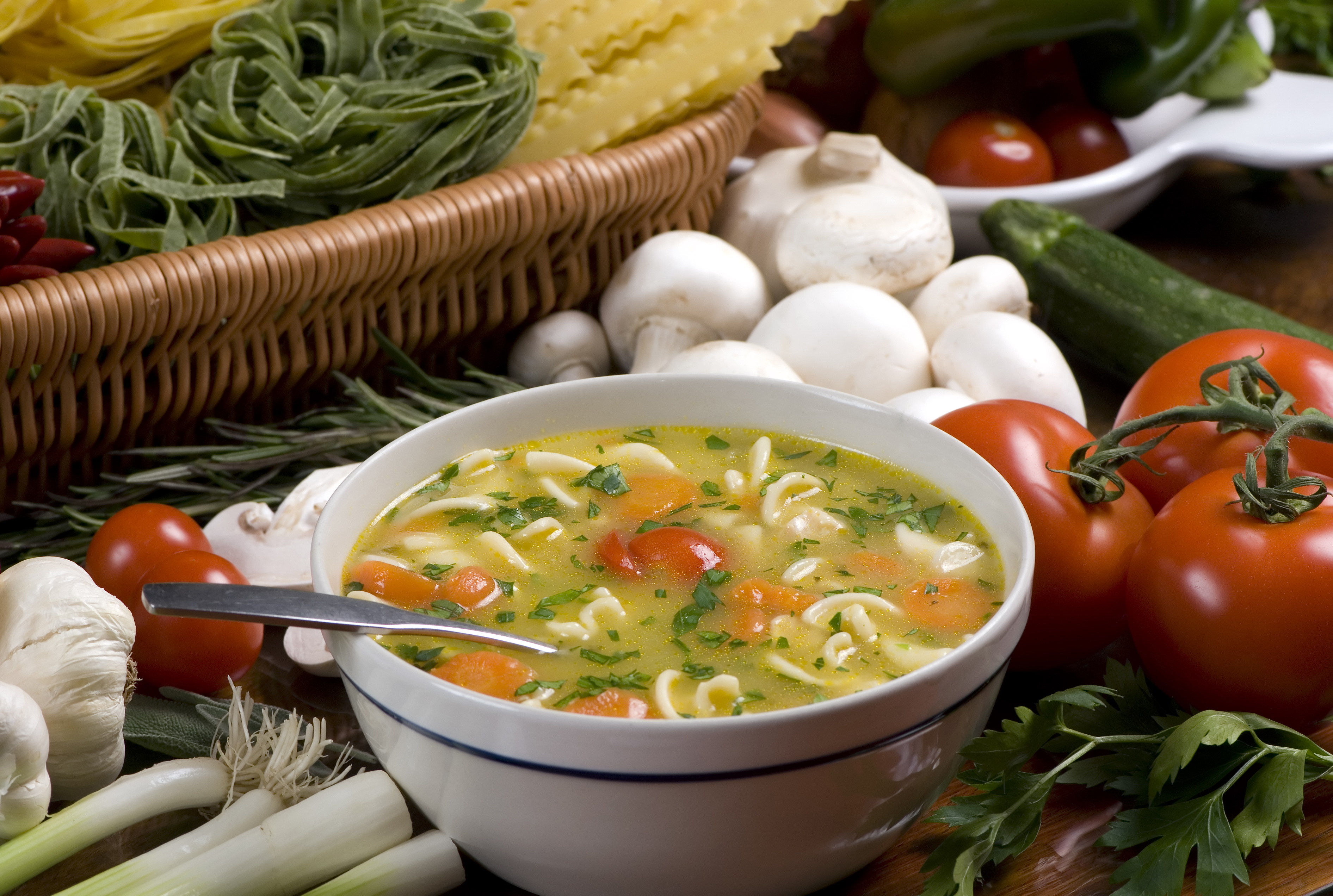 January is National Soup month, and it’s also the month when people get colds and flues. It’s especially important during these cold winter months to support your immune system, get plenty of sleep, and try to maintain an uplifted mood.
January is National Soup month, and it’s also the month when people get colds and flues. It’s especially important during these cold winter months to support your immune system, get plenty of sleep, and try to maintain an uplifted mood.
Winter soups can warm us, strengthen us, help heal us and protect us from getting sick. Home-made soup contains fresh ingredients that have more antioxidants, vitamins, minerals, and protein. Canned soups are typically overcooked, high in sodium, and can have additives and preservatives. A big pot of soup will last several days, saving time in the kitchen. It is also an easy-to-eat, easy-to-digest form of nutrition for patients with a chronic illness such as Alzheimer’s, and for those bed-ridden with the flu.
If you’re lucky, your grandmother or mother gave you their delicious soup recipes. Here are some of my favorites for nourishing the body and soul during the cold winter months.
Immune boosting soups
Tomato Vegetable Soup
- 2 cans whole tomatoes (organic, chopped)
- 2 onions (sautéed)
- 6 cloves garlic (pressed and sautéd)
- 1⁄2 tsp oregano (dried)
- 1 medium winter squash (peeled and cut into chunks)
- 1 medium rutabaga (chopped)
- 1 bunch turnips (chopped greens and roots)
- 1 pound zucchini (cut into chunks)
Add water to cover and simmer until done. Serve with brown rice or couscous.
Minestrone
- 4 tablespoons extra-virgin olive oil, divided
- 1 medium yellow onion, chopped
- 2 medium carrots, peeled and chopped
- 2 medium ribs celery, chopped
- 2 cups chopped seasonal vegetables (potatoes, yellow squash, zucchini, butternut squash, green beans or peas; whatever you have)
- 2 cloves garlic, pressed or minced
- ½ teaspoon dried oregano
- ½ teaspoon dried thyme
- 1 large can (28 ounces) diced tomatoes, with their liquid (or 2 small 15-ounce cans)
- 4 cups (32 ounces) vegetable broth
- 2 cups water
- 1 teaspoon fine sea salt
- 1 bay leaf
- Pinch of red pepper flakes
- Freshly ground black pepper
- 1 cup whole grain orecchiette, elbow or small shell pasta
- 1 can (15 ounces) Great Northern beans, cannellini beans, or kidney beans rinsed and drained, or 1 ½ cups cooked beans
- 2 cups baby spinach or 2 cups chopped and carefully washed spinach.
- Freshly grated Parmesan cheese, for garnishing (optional)
Heat the oil in a large pot and add the onion, carrots and celery. When the onion is translucent add the chopped seasonal vegetables, garlic, oregano and thyme and cook for about 2 minutes. Next, add the broth, water, salt, bay leaf, pepper flakes, and pepper. Bring to a boil and then lower to simmer and cook for about 15 minutes. Add the beans, cook for an additional 10 minutes. Add the spinach and cook until wilted. Ladle cooked pasta into each bowl and add the soup on top. Do not cook the pasta in the soup because it will eventually turn to mush. Garnish with Parmesan cheese.
Miso Stew
- 5 cups water
- 1/2 cup dried quinoa, rinsed
- 1 onion chopped
- 4 cloves garlic
- 1 tsp-sized chunk minced ginger
- 2 stalks chopped celery
- 2 carrots chopped
- 1 cup chopped kale
- 1/4 cup torn pieces combo/arame/nori seaweed (your choice)
- 2 eggs (optional)
- 1/4 cup organic red or white miso
- 3 tsp toasted sesame oil
- 1/2 tsp turmeric
- 1/4 tsp cayenne
Saute onion until soft in 2 tsp of the sesame oil. Add garlic and cook for a few minutes. Bring water, quinoa and carrots to a boil. Reduce to medium and add onion, garlic, ginger, celery and seaweed (if it’s a firm variety). Cook for five minutes. Crack eggs into pot and stir gently. When egg is mostly cooked, remove from heat and add kale and any tender seaweed. In a separate bowl mix miso, the remaining sesame oil, turmeric and cayenne. Add a large spoonful of broth (not boiling) and stir until smooth. When pot of soup has cooled enough to touch, add in miso mixture and serve hot. This soup can be reheated but do not boil the miso because this will kill the beneficial enzymes.
Chicken soup (Jewish penicillin)
- 1 large whole chicken
- 4 carrots chopped
- 3 stalks celery chopped
- 2 medium parsnips chopped
- 2 medium rutabagas
- 1 large onion chopped
- small bunch of fresh dill
- 2 Tbs salt, or salt to taste
Wash the chicken inside and out, remove any feathers and place in a large pot. Cover the chicken with water. Bring the liquid to a boil, lower the heat, and for the next several minutes, remove any scum that rises to the surface. Add the vegetables and salt.
Cover the pan partially and simmer the soup for 2-1/2 hours or until the chicken meat is very soft when pierced with the tip of a sharp knife. Pour the soup through a strainer or colander into a large bowl or a second pot. Set the chicken and vegetables aside. Remove the fat from the surface of the liquid with a spoon or fat-skimming tool.
For best results, refrigerate the strained soup; when it is cold, the fat will rise to the surface and harden and you can scoop it off. (Refrigerate the vegetables and the chicken separately.) Serve the soup plain or with the vegetables and boned, cut-up chicken.
Ward off the negative effects of stress
Mineral Broth
This broth helps to alkalize the body and warm the system. It also helps counter the negative effects of stress. Have it as a bowl of soup, or sip it throughout the day.
Wash with a scrub brush and cut into 1-inch chunks:
- 1 medium potato (any variety, raw with skin)
- 1 cup zucchini
- 1 cup cabbage
- 1 cup green beans
- 2 cups celery cut into strips:
- 1 cup kale or collard greens
- 1 cup onion
Coarsely chop:
- a small bunch of dill weed
- 1 clove garlic
Place ingredients in a large pot with a lid. Cover with water, just to the level of the vegetables and add:
- 6 slices fresh ginger root
- 1/4 cup or more seaweed (dulse, nori, wakame, hiziki, kombu)
- Seasonal greens (kale, mustard, spinach, broccoli)
Variations:
- Add cubed sweet potato to soup mix in the beginning of cooking time.
- Add 1⁄2 tsp. curry 10 minutes before serving for a zesty flavor.
Alleviate joint and inflammation
Bone broth
- 6 pounds of any kind of bones (beef, chicken, etc.)
- 3 cups of your favorite vegetables, chopped (carrots, celery, onion, potatoes, etc.)
- 1 bunch flat parsley
- 1 bunch fresh thyme
- 1 head garlic, halved crosswise
- 2 Bay leaves
- 1 Tbs vinegar*
- pepper and salt to taste
Rinse the bones in a large pot with cold water. Drain the water and place the bones back in the pot. Cover with at least 4 inches of cold water and cook over medium-high heat for about 45 minutes until the liquid boils. Reduce heat to medium.
Simmer until broth looks clear, about 1 hour. Skim the fat off occasionally using a ladle. Add the rest of the ingredients and simmer for 2 hours. Skim off fat and discard bits of meat. Then pour the broth through a fine-mesh strainer. Discard the solids. Cool before storing. This broth can be sipped throughout the day. It will keep in the refrigerator for 3 days. It can also be frozen in BPA-free bags, glass jars and BPA-free plastic containers.
* You must add some vinegar to the pot of soup in order to force the calcium in the bones to dissolve from the bones into the soup juice. Just 1 pint of soup can give you as much as 1,000 milligrams of calcium.
Ayurvedic healing soup
This traditional soup is wonderful during times of stress, stomach upset, and any time the appetite is diminished due to sickness or stress.
Kicheree
- 4 Tbs organic Basmati rice
- 4 Tbs mung dal or red lentils
- 4 1/2 cups water (more or less, depending on whether you like it soupy or thick)
- 2 tsp grated fresh ginger
- 2 Tbs fresh lemon juice
- 1 cup assorted veggies cut bite-sized (zucchini, yam, carrot, cauliflower, broccoli, etc.)
- 1 tsp ground coriander seed
- 1 tsp ground cumin seed
- 1/4 tsp turmeric
- salt and pepper to taste
Combine the rice, dal ginger, veggies and water in pot. Add the spices. Bring to a boil over medium heat; then lower to a simmer for 45-50 minutes. Add water if it gets too thick. Remove from the stove. Add the lemon juice, salt and pepper.
Enjoy!
For more great information about how you can reduce stress, feel happier, more energetic, healthier, deal with issues of grief and depression, and ultimately experience inner peace, read Calmer Waters: The Caregiver’s Journey Through Alzheimer’s and Dementia. Available on Amazon and at all bookstores that sell quality books.


